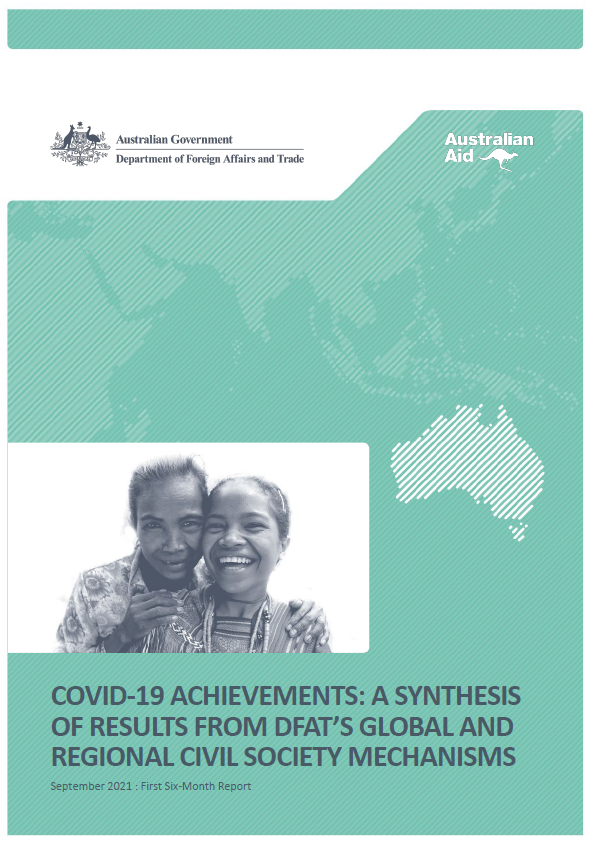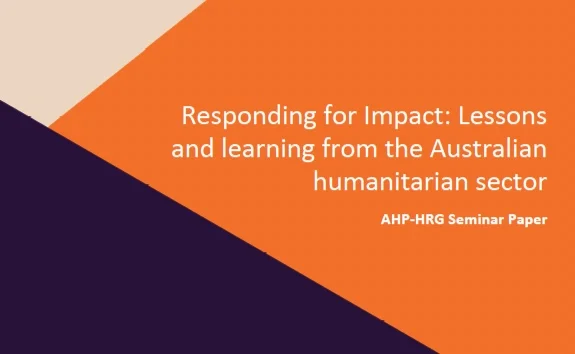This case study explores Fiji’s progress in integration of climate change adaptation and DRR, identifying key themes and opportunities for stakeholders to advance approaches that reduce risk and enhance resilience at the community level in Fiji.
In PNG disaster risk reduction and climate change adaptation activities largely operate largely in silos. This case study identifies opportunities for high-quality integrated approaches at the local and provincial levels to be replicated and scaled.
This case study explores Solomon Islands’ progress in the integration of DRR and climate change adaptation (CCA), identifying key themes and opportunities for stakeholders to advance approaches that reduce risk and enhance resilience in communities.
This case study on the integration of disaster risk reduction and climate change adaptation policies in Vanuatu is part of the ‘Beyond Barriers’ series, an initiative of Humanitarian Advisory Group, Australian Humanitarian Partnership and World Vision Australia.
This case study is part of the Humanitarian Advisory Group and World Vision Beyond Barriers research project on climate change adaptation and disaster risk reduction integration, focusing on Australian Humanitarian Partnership programming in Timor-Leste.
This report presents outcomes from a Learning Forum in November 2021 to further explore opportunities to advance the integration of disaster risk reduction and climate change adaptation in the Pacific.
A scoping report on gaps and opportunities for improving diverse SOGIESC inclusion in cash transfer and social protection programs, during the COVID-19 crisis and beyond.
This report provides a synthesis of results of DFAT-funded regional and global civil society COVID-19 efforts and reporting against common indicators aligned with the Partnerships for Recovery strategy.
An independent evaluation of Phase II of the AHP’s response to the Rohingya Humanitarian Crisis.
A research report produced jointly by Humanitarian Advisory Group, Australian Humanitarian Partnership and World Vision Australia.
An independent evaluation of disability inclusion in disaster preparedness and response in the Disaster READY program, June 2021.
A collective effort by Australian Humanitarian Partnership organisations in Fiji, this analysis highlights issues facing marginalised groups in the simultaneous crises of COVID-19, Tropical Cyclone Yasa and Tropical Cyclone Ana.
Disaster READY: This review was commissioned by CARE International in Papua New Guinea to support Disaster READY PNG evidence collection and planning.
Early evaluation findings and recommendations to inform responses to COVID-19, August 2020
Disability inclusion report and recommendations from the Timor-Leste national Disabled Persons Organisation, RHTO, following a rapid needs assessment of floods in Dili.
Read the findings and recommendations of a mid-term evaluation of the AHP’s multi-year humanitarian response in Iraq - the Building Peaceful Futures Program.
This conflict analysis of Sinja and Hawija districts in Iraq was undertaken to support our Building Peaceful Futures consortium to navigate the impacts of decades of conflict on communities as they seek to return and rebuild - both the physical infrastructure and their community and social connections.
This paper presents a critical reflection of Church Agencies Network Disaster Operations (CAN DO) 2017-2018 localised response to the Monaro Volcano eruption in Vanuatu. The response was funded by the Australian Government through the Australian Humanitarian Partnership.
Read the findings and the recommendations of the evaluation of the Australian Humanitarian Partnership’s response to the 2018 Highlands Earthquake in Papua New Guinea.
Read the lessons and insights from the ‘Responding for Impact’ seminar, hosted by the Australian Humanitarian Partnership and the Humanitarian Reference Group (chaired by ACFID) in July 2019.
Read the recommendations of an independent evaluation of the AHP response to the Rohingya refugee crisis in Bangladesh.
Read the findings and recommendations of an independent evaluation of the AHP response to the humanitarian crisis in Yemen.































The report draws on two comparative case studies in Vanuatu and Solomon Islands, as well as an extensive desk review of documents. It explores the roles and impact of Organisations of Persons with Disabilities (OPDs) in each country and identifies key challenges and enablers constraining and supporting OPDs’ contributions to the disaster preparedness and response sector. A localisation lens was applied to the study to enable the identification of practices that support the empowerment of OPDs as local advocates and disaster preparedness and response actors.